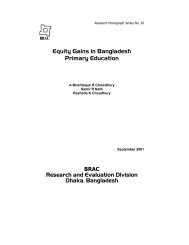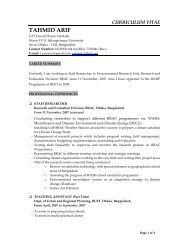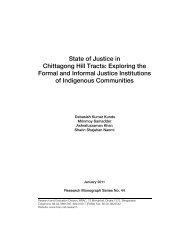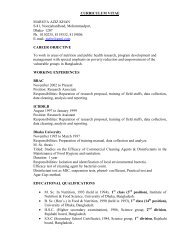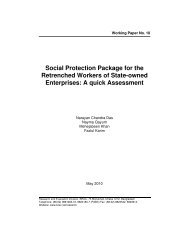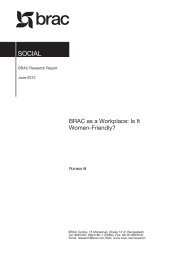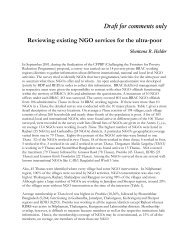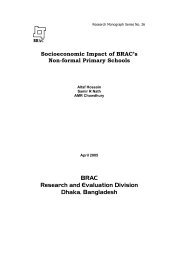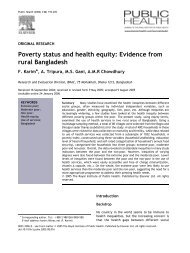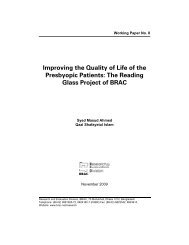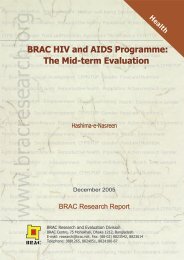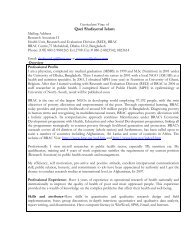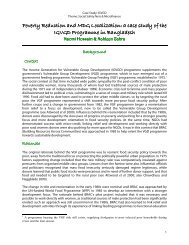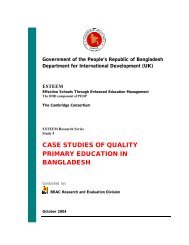Combining health and social protection measures to reach the ultra ...
Combining health and social protection measures to reach the ultra ...
Combining health and social protection measures to reach the ultra ...
Create successful ePaper yourself
Turn your PDF publications into a flip-book with our unique Google optimized e-Paper software.
Innovation<br />
Some plausible causes of <strong>the</strong> know-do gap<br />
Limited access <strong>to</strong> information, technology <strong>and</strong> medicines (digital divide,<br />
intellectual property rights, patents)<br />
Ignorance of evidence-based problem-solving <strong>and</strong> learning approaches in<br />
<strong>health</strong> (including lack of learning from development projects due <strong>to</strong><br />
structure of aid process)<br />
Lack of need-driven research, particularly in developing countries<br />
Lack of ownership of knowledge by potential “users”/“adopters”<br />
Lack of creation/exploitation of knowledge from practice (evaluation,<br />
continuous improvement)<br />
Slow diffusion of innovation or scale up<br />
Some ongoing efforts <strong>to</strong> address <strong>the</strong> causes<br />
Medline, Health InterNetwork Access <strong>to</strong> Research Initiative (HINARI), Health<br />
information network (HifNet), Iowa University, Global Health Library,<br />
specialized libraries & portals (Maternal <strong>and</strong> Child Health (MCH), AIDS),<br />
Google scholar, virtual <strong>health</strong> libraries <strong>and</strong> o<strong>the</strong>r country initiatives, Digital<br />
Solidarity Fund<br />
International Network of Clinical Epidemiology (INCLEN), Cochrane<br />
collaboration, Cambell collaboration, UK NICE, guidelines <strong>and</strong> courses by<br />
professional associations, Health Evidence Network, EVIPNETs, etc.<br />
National Institutes of Health (country priorities), Council on Health Research<br />
for Development (COHRED), Global Forum for Health Research, WHO Special<br />
Programme on Research <strong>and</strong> Tropical Diseases (TDR), specialized<br />
initiatives, including new Public-Private Partnerships in Research &<br />
Development for diseases of poverty<br />
Successful immunization campaigns, <strong>to</strong>bacco-free inititatives, <strong>social</strong><br />
entrepreneurship, knowledge brokering (Canada, Ne<strong>the</strong>rl<strong>and</strong>s)<br />
Institute for Health Care Improvement (IHI), Bangladesh Rehabilitation<br />
Assistance Committee (BRAC), Management Sciences for Health (MSH),<br />
Tanzania Essential Health Interventions Project (TEHIP)<br />
Strategic advocacy (Médecins Sans Frontières), <strong>social</strong> marketing (Greenstar-<br />
Pakistan-based <strong>social</strong> marketing organization), <strong>social</strong> entrepreneurship<br />
(BRAC, Ashoka Fellows)<br />
Table 1: Some causes of <strong>the</strong> know-do gap <strong>and</strong> ongoing efforts <strong>to</strong> address <strong>the</strong>m<br />
Frequent sources of knowledge<br />
✜ Scientific <strong>and</strong> informal research (new or not)<br />
✜ Surveillance systems<br />
✜ Project moni<strong>to</strong>ring <strong>and</strong> evaluation<br />
✜ Practical experience<br />
✜ His<strong>to</strong>rical or news facts<br />
✜ O<strong>the</strong>rs<br />
Layers for knowledge-based activities in <strong>health</strong><br />
✜ Policy work<br />
✜ Institutional management<br />
✜ Technology/R&D<br />
✜ Clinical service provision<br />
✜ Community enterprises<br />
✜ Individual behaviour<br />
(<strong>health</strong>y lifestyle, adherence)<br />
✜ O<strong>the</strong>rs<br />
Select mechanisms or “schools” for KT<br />
✜ Utilization research<br />
✜ Operational & action research<br />
✜ Evidence-based guidelines<br />
✜ Knowledge brokers, sages<br />
✜ Implementation science<br />
✜ Strategic planning & management<br />
✜ Continuous improvement<br />
✜ Social entrepreneurship<br />
Table 2: Frequent sources <strong>and</strong> types of knowledge <strong>and</strong> select mechanisms for KT<br />
Knowledge Translation<br />
The importance of Knowledge Translation (KT) is its potential<br />
<strong>to</strong> bridge <strong>the</strong> know-do gap, <strong>the</strong> gap between what is known<br />
<strong>and</strong> what gets done in practice. This gap between knowledge<br />
<strong>and</strong> its application is not new, but <strong>to</strong>day systematic<br />
approaches <strong>to</strong> address it are urgently needed 13 .<br />
KT is being developed at a time when unprecedented<br />
global investments in <strong>health</strong> research have generated a vast<br />
pool of knowledge that is underused <strong>and</strong> not translated<br />
rapidly enough in<strong>to</strong> new or improved <strong>health</strong> policies,<br />
products, services <strong>and</strong> outcomes. KT comes at a time where<br />
<strong>the</strong> gap between what is known <strong>and</strong> what gets done (<strong>the</strong><br />
know-do gap) is highlighted by shortfalls in equity (e.g.<br />
Millennium Development Goals) <strong>and</strong> quality (e.g. patient<br />
safety movement) in <strong>health</strong> services 14 . However, we witness<br />
a limited interpretation of KT as a linear transaction between<br />
research “producers” <strong>and</strong> “users” trading knowledge as a<br />
commodity. Knowledge can be created without science <strong>and</strong><br />
KT is not research; it moves from responding <strong>to</strong> curiosity <strong>to</strong><br />
focusing on purpose <strong>and</strong> problem-solving. It is defined as “<strong>the</strong><br />
syn<strong>the</strong>sis, exchange <strong>and</strong> application of knowledge by relevant<br />
stakeholders <strong>to</strong> accelerate <strong>the</strong> benefits of global <strong>and</strong> local<br />
innovation in streng<strong>the</strong>ning <strong>health</strong> systems <strong>and</strong> improving<br />
people’s <strong>health</strong>” 15 . More concretely, KT is about creating,<br />
transferring <strong>and</strong> transforming knowledge from one <strong>social</strong> or<br />
organizational unit <strong>to</strong> ano<strong>the</strong>r in a value-creating chain – a<br />
complex interactive process that depends on human beings<br />
<strong>and</strong> <strong>the</strong>ir context.<br />
Knowledge Translation is a cross-cutting, non-linear<br />
process that involves not only recent research findings but<br />
also knowledge that is created from <strong>the</strong> dynamic interaction<br />
of people who come <strong>to</strong>ge<strong>the</strong>r <strong>to</strong> solve public <strong>health</strong> problems,<br />
<strong>to</strong> learn <strong>and</strong> ultimately <strong>to</strong> drive productive change. Attention<br />
should be given <strong>to</strong> <strong>the</strong> knowledge itself, but even more so <strong>to</strong><br />
<strong>the</strong> purpose, people <strong>and</strong> processes involved. The processes<br />
from knowledge generation <strong>to</strong> application are complex <strong>and</strong><br />
influenced by fac<strong>to</strong>rs including local context (where practice<br />
takes place), <strong>and</strong> <strong>the</strong> perceived relevance of knowledge that<br />
is enhanced when owned by relevant stakeholders.<br />
Translating knowledge in<strong>to</strong> new or improved <strong>health</strong><br />
policies, services <strong>and</strong> outcomes requires a clear<br />
underst<strong>and</strong>ing of <strong>the</strong> characteristics of this process, <strong>the</strong> ways<br />
it can be used, <strong>the</strong> conditions governing it, <strong>and</strong> criteria <strong>to</strong><br />
assess its impact.<br />
When addressing issues related <strong>to</strong> KT, technical experts<br />
have <strong>the</strong> inclination <strong>to</strong> depend almost exclusively on encoded<br />
Global Forum Update on Research for Health Volume 4 ✜ 105



